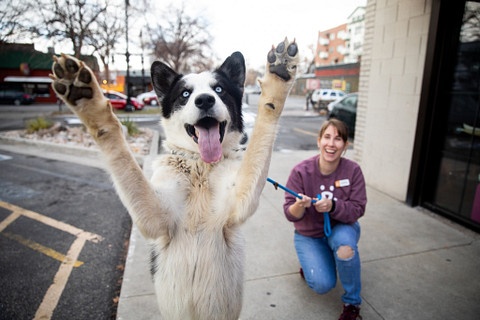
America has a long history of affection for mutts. Two of cinema’s most famous dogs – Spike from “Old Yeller” and Higgins from “Benji” — were mutts adopted from shelters. Heroic mutts such as Balto, the sled dog who brought lifesaving diphtheria medication to remote corners of Alaska, are immortalized in bronze statue form. Even the currently fashionable “doodles” selling for thousands of dollars are a mix of two dogs (which is really just a mutt).
Ask veterinarian Erin Katribe, Best Friends Animal Society’s medical director, and she’ll tell you about two very special mutts that hold a place in her heart.
“As an adult, the first dog I had was a rescue mutt that I encountered at the local non-profit clinic where I was volunteering before vet school. Akasha and I were immediately connected, and we spent the next 16 years together. She was my ‘heart’ dog,” Katribe said.
More recently, Franklin, a Hurricane Harvey and distemper survivor, who is an indiscernible combination of breeds continues to teach Katribe. “In the beginning, it was about canine distemper, and now it’s about love and life, as only a dog can teach us humans,” she added.
Those who have adopted pets all have stories like this. That’s why Best Friends Animal Society is celebrating National Mutt Day this July 31 by sharing why mutts often make for the very best of friends:
No two mutts are alike. That can make your dog the talk of your block, the latest social media star or simply a great companion. “Every time I walk through a shelter, large or small, I see a stunning array of dogs of all shapes and sizes,” Katribe said. “Each one is beautifully unique.”
Mixed breed dogs (aka mutts) tend to have a lower risk of hereditary diseases than purebred dogs. “Even when breeders make efforts to remove dogs with heritable medical problems from their breeding pools, some conditions will get by undetected in earlier generations,” Katribe said. “Hereditary problems are very common at puppy mills or with irresponsible breeders, as breeding stock is not selected for based on any health criteria.”
The temperament of a mutt can be just as solid as a purebred. “While some breeds do have behavioral tendencies related to their breeding (for example, herding behavior in dogs bred for that purpose), there are no guarantees that a purebred dog will follow that tendency,” Katribe explained. “The reality is that every dog is an individual.”
Most mutts are not born in cruel puppy mills or other unfortunate circumstances, Katribe noted. “For dogs that are bred and born in puppy mill situations or by irresponsible breeders, both the parents and puppies are often kept in inhumane and unsanitary conditions. While the puppies get sold, the parents can live in these horrible conditions for many, many years.”
If you really like purebreds, you can find a mutt that’s pretty close. “One strategy to get the best of both worlds – choose a mutt that is primarily of your chosen breed,” Katribe said. “You’ll get the hardiness of a mutt with the look and, potentially, behavioral tendencies of your chosen breed.”
Whether you have a beloved mutt at home or are thinking of adding a dog to your family, Katribe suggests visiting your local shelter to see how you can help dogs awaiting adoption.
“If you aren’t able to adopt right now, consider fostering or even taking a dog on a short outing to get them out of the stressful shelter environment for a night or a few hours,” she said. “If fostering is not an option, then volunteer or donate – shelters can’t save lives without the support of their community.”
To find a shelter or rescue near you, visit www.bestfriends.org.
About Best Friends Animal Society
Best Friends Animal Society is a leading animal welfare organization working to end the killing of dogs and cats in America’s shelters by 2025. Founded in 1984, Best Friends is a pioneer in the no-kill movement and has helped reduce the number of animals killed in shelters from an estimated 17 million per year to about 347,000.
Best Friends runs lifesaving programs all across the country, as well as the nation’s largest no-kill animal sanctuary. Working collaboratively with a network of more than 3,300 animal welfare and shelter partners, and community members nationwide, Best Friends is working to Save Them All®.
For more information, visit bestfriends.org.
